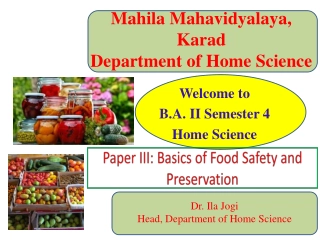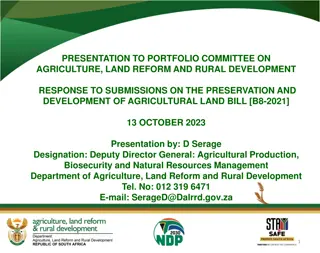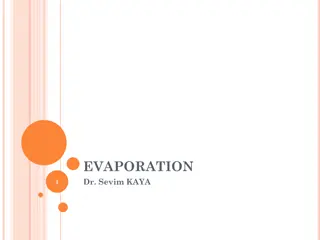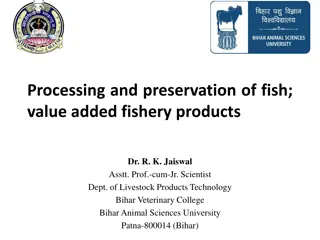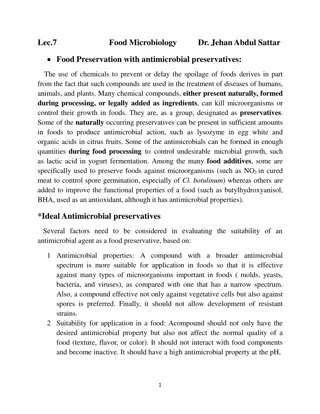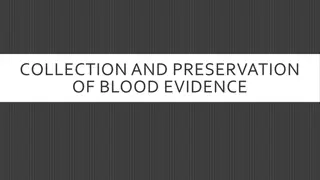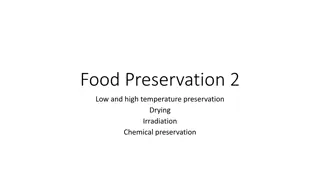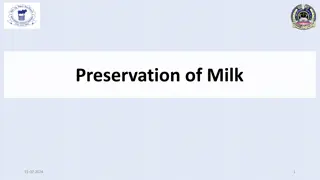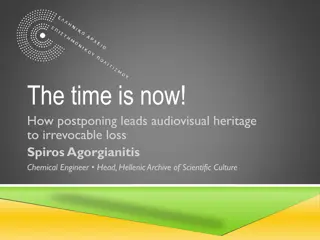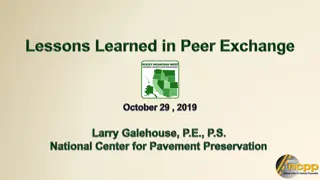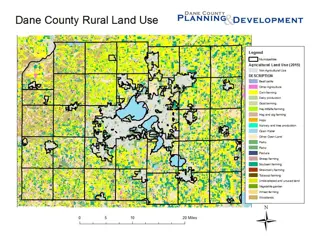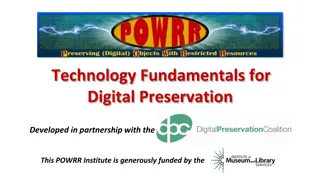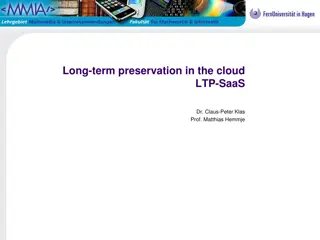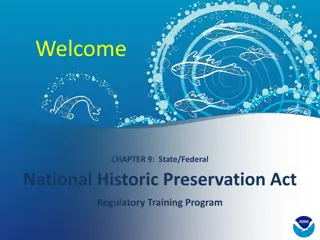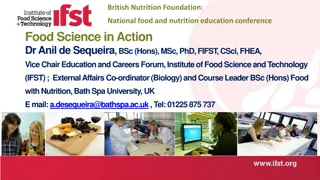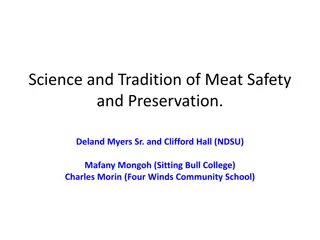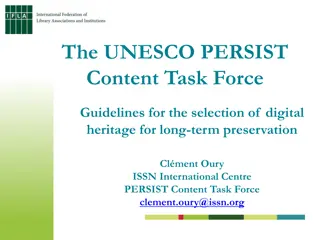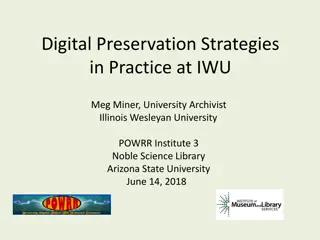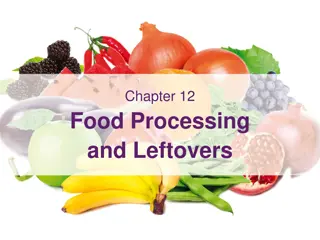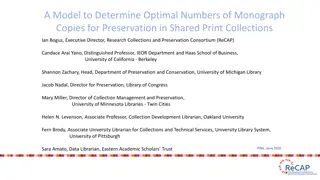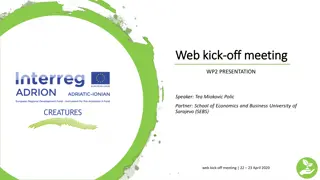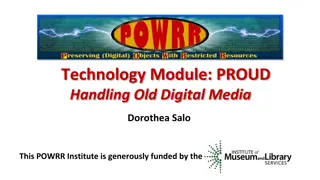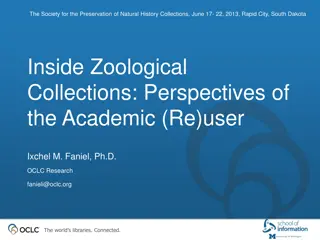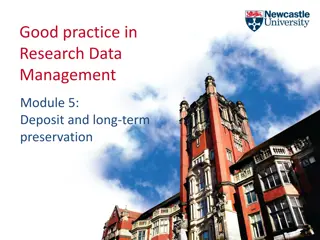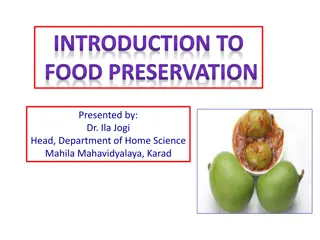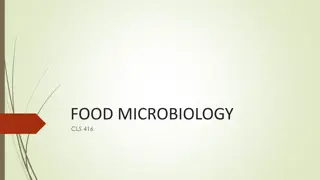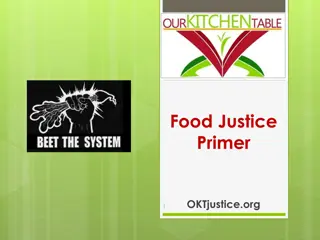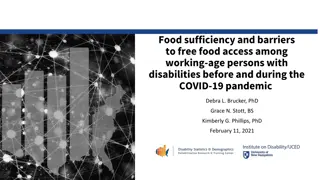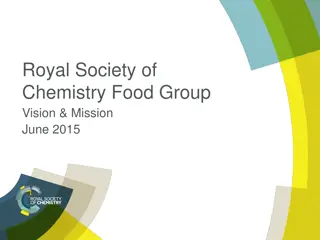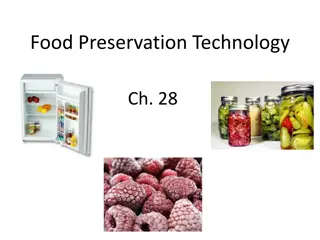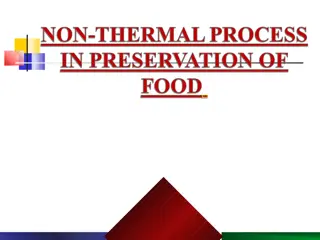Comprehensive Guide to Food Safety and Preservation in Home Science
Explore the world of food safety and preservation through this detailed course in Home Science at Mahila Mahavidyalaya, Karad. The course covers topics like basics of food safety, principles of food preservation, methods of food preservation, and practical sessions on preparing various food items. G
1 views • 6 slides
Response to Submissions on Preservation and Development of Agricultural Land Bill
Deputy Director General D. Serage presents to the Portfolio Committee on Agriculture, Land Reform, and Rural Development regarding the feedback received on the Preservation and Development of Agricultural Land Bill. Various organizations made oral and written submissions during public hearings, cont
0 views • 71 slides
Arkansas Historic Preservation Program
This content provides insights into the Arkansas Historic Preservation Program (AHPP) grants aimed at supporting the preservation, restoration, and rehabilitation of historic properties in Arkansas. The grants focus on maintaining structural integrity, addressing deficiencies, ensuring safety and co
1 views • 23 slides
How are plant essential oils valuable as functional ingredients
Food Research Lab is one of the leading food industry consultants and offers various food production services. We provide food production and food manufacturing consultancy services to food, beverage and nutraceutical companies. Primary food production involves everything from food procurement, inve
8 views • 12 slides
Understanding Evaporation in the Food Industry
Evaporation, a key process in the food industry, involves removing excess water from raw materials or processed foods to enhance preservation and reduce costs. It requires considerations such as heat transfer, temperature control, and prevention of overheating. Evaporation differs from dehydration a
0 views • 22 slides
Fish Processing and Preservation Methods for Quality and Longevity
Fish are highly perishable and require proper preservation techniques to maintain their quality and freshness. Methods such as chilling, freezing, and other preservation techniques are employed to extend the shelf life of fish for short and long durations. Quick freezing is preferred for long-term s
1 views • 17 slides
Food Preservation with Antimicrobial Preservatives
Food preservation with antimicrobial preservatives involves the use of chemical compounds to prevent or delay food spoilage. These compounds, either naturally present or added during processing, can kill microorganisms or control their growth in foods. Factors for evaluating the suitability of an an
6 views • 8 slides
Blood Evidence Collection and Preservation Guidelines
Learn about the proper collection and preservation methods for liquid blood, dried stains, stained clothing, swabs of stains, and envelopes in forensic investigations. Follow detailed instructions for identification, preservation, wrapping, and packing to ensure the integrity of blood evidence.
0 views • 11 slides
Understanding Blanching: A Key Step in Food Preservation
Blanching is a crucial pre-treatment process for vegetables and fruits in food preservation methods like canning, freezing, and dehydration. By rapidly heating the food and then cooling it, blanching helps inactivating enzymes, removing gases, brightening colors, and improving texture. This process
1 views • 17 slides
Milk Preservation Techniques and Methods
Milk can be preserved using various techniques such as chilling, pasteurization, and chemical preservation methods like hydrogen peroxide. The shelf life of milk can be extended by cooling or utilizing the lactoperoxidase system. Germicidal properties of fresh milk and naturally occurring inhibitory
3 views • 16 slides
Understanding Food Packaging and Labelling Requirements in NSW Education
Learn about the importance of food packaging options, including materials used and the roles they play in protecting food products. Explore the reasons for food packaging in terms of preservation, marketing, and consumer information needs. Discover the legislative requirements for food labelling in
5 views • 18 slides
Food Equipment Usage Guidelines for Safe Food Handling
Enhance your knowledge on using equipment for making food with proper safety procedures. Learn about essential points like wearing protective gear, checking hot food temperatures, food safety principles, and sanitization requirements. Understand machine settings, food temperature checks, and serving
1 views • 22 slides
The Time is Now: Urgency of Audiovisual Preservation
Postponing digital preservation of audiovisual heritage can lead to irreversible loss. The urgency lies in the deteriorating nature of audiovisual media and the necessity of digitization for long-term preservation. Challenges include lack of awareness, obsolescence of playback equipment, and excuses
0 views • 26 slides
National Food Reserve Agency (NFRA): Enhancing Food Security in Nigeria
The National Food Reserve Agency (NFRA) under the Federal Ministry of Agriculture & Water Resources plays a crucial role in addressing agricultural production, storage, and marketing challenges in Nigeria. With a vision to ensure sustainable food access for all Nigerians and become a global food pro
1 views • 30 slides
National Wilderness Preservation System Overview
Explore the history, purpose, and values of the National Wilderness Preservation System in the United States through this presentation. Discover key facts, trends, and management principles related to over 109 million acres of protected wilderness areas managed by federal agencies. Gain insights int
0 views • 13 slides
Pavement Preservation Treatment Knowledge Transfer Analysis
The analysis discusses the peer exchange facilitators, knowledge transfer process between Lead and Explorer States, disadvantages of limited knowledge transfer, and details of pavement preservation treatment experience in various states. It emphasizes the importance of sharing expertise to enhance p
0 views • 48 slides
Dane County Farmland Preservation Plan Overview
This overview highlights the Dane County Farmland Preservation Plan, which includes planning areas, preservation programs, zoning regulations, density caps, siting criteria, and more to protect agricultural lands and promote sustainable development in Dane County, Wisconsin.
0 views • 9 slides
Technology Fundamentals for Digital Preservation
This course covers common computer systems, file formats, open-source software, and the OAIS standard for digital preservation. Participants will learn about operating systems, file systems, and file format preservation issues. The course also explores the differences between Windows and Unix operat
1 views • 80 slides
Long-term Preservation in the Cloud: Data Management and Architecture Overview
Exploring the intricate landscape of long-term preservation in the cloud, this material delves into data management life cycles, roles, preservation awareness, collaborative search and access mechanisms, OAIS compliance, and user interface considerations. It highlights the importance of proactive pr
0 views • 10 slides
National Historic Preservation Act: Background and Requirements
The National Historic Preservation Act (NHPA) was established in 1966 to protect historic resources in the United States. It was a response to the alarming damage caused by large-scale projects post-World War II. The Act requires federal agencies to consider the impacts of their undertakings on hist
2 views • 18 slides
Exploring Food Science and Technology in Modern Society
Delve into the world of food science and technology with insights on what scientists do, the importance of understanding food, definitions of food science and food technology, factors affecting food spoilage, and traditional and modern food processing technologies. Gain knowledge on testing hypothes
0 views • 22 slides
Enhancing High Energy Physics Research Through Analysis Preservation and Generator Tuning
Delve into the world of high-energy physics with a riveting journey through the analysis preservation and tuning of hadronic interaction models. Learn about the motivation, goals, and processes involved in making research results accessible, publicly available, and reproducible. Explore the tools an
0 views • 23 slides
Exploration of Meat Preservation Techniques from Various Cultures
This project delves into the science and tradition of meat safety and preservation, focusing on beef jerky as a counterpart to traditional Native American dried meats. It includes activities like preparing jerky, evaluating salt's impact on preservation, and sensory testing. Additionally, it explore
0 views • 23 slides
UNESCO PERSIST Content Selection Guidelines: Long-Term Preservation Strategy
Providing guidance to memory and cultural institutions on selecting digital heritage for preservation, the UNESCO PERSIST Content Task Force emphasizes the importance of safeguarding digital materials for future generations. Highlighting the risk of losing valuable heritage, the guidelines stress th
0 views • 15 slides
Practical Strategies for Digital Preservation at IWU
Explore digital preservation strategies in practice at Illinois Wesleyan University. Learn from Meg Miner, the University Archivist, about preservation philosophy, local-centric decisions, and the importance of prioritizing digital collections inventory. Gain insights into updates on processing acti
0 views • 33 slides
Food Processing and Leftovers: Understanding Preservation Techniques
Food processing plays a crucial role in preserving and extending the shelf life of foods. This chapter explores the advantages and disadvantages of food processing, the conditions microorganisms need to grow, various methods of food preservation, guidelines for freezing food, the significance of bla
0 views • 33 slides
Optimal Monograph Preservation in Shared Print Collections
A model is proposed by Ian Bogus, Candace Arai Yano, Shannon Zachary, Jacob Nadal, Mary Miller, Helen N. Levenson, Fern Brody, and Sara Amato to determine the ideal number of monograph copies for preservation in shared print collections. The model considers variables such as on-shelf probability, bi
0 views • 11 slides
Enhancing Cultural Heritage Preservation and Sustainable Tourism through CCI and SME Capacities
This project aims to enhance knowledge, skills, and competitiveness of Cultural and Creative Industries (CCI), Small and Medium Enterprises (SMEs), and startups in supporting cultural heritage preservation and sustainable tourism. Activities include developing a common working methodology, E-catalog
0 views • 27 slides
Mastering Good Food Hygiene and Storage Practices
Understanding food spoilage causes, common food-poisoning bacteria, conditions for bacterial growth, ways to prevent food contamination, safe food handling practices, HACCP concept, types of perishable foods, importance of proper food storage, packaging materials for food, and recognizing signs of f
1 views • 27 slides
Handling Old Digital Media for Preservation: Equipment, Procedures, and Outsourcing Options
Learn how to handle old digital media effectively for preservation, including equipment requirements, write-protection methods, and capturing disk images. Understand the importance of copying data promptly due to media fragility. Explore in-house and outsourcing options for preserving valuable digit
0 views • 24 slides
Digital Preservation in Academic Research Data Reuse
The Society for the Preservation of Natural History Collections conducted a project funded by IMLS to study data reuse and digital preservation in academic disciplines. The research team explored significant properties of social science, archaeological, and zoological data for effective preservation
0 views • 14 slides
Best Practices for Research Data Management: Deposit and Long-Term Preservation
Explore essential topics in long-term data management, including considerations for data centers and repositories, metadata usage, and digital curation. Understand the distinctions between digital archiving, preservation, and curation, along with key questions regarding data deposits and embargoes.
1 views • 28 slides
Understanding Food Preservation: Techniques and Importance
Food preservation is a crucial aspect of ensuring food safety, extending shelf life, and preventing spoilage. This article delves into the definition of food preservation, its objectives, and the importance of preserving foods. From preventing microbial contamination to increasing food availability,
0 views • 10 slides
Bridge Preservation Partnerships: Upcoming Meetings and Initiatives
Explore upcoming meetings and initiatives of various Bridge Preservation Partnerships across different regions in the United States. Topics include deck preservation, emergency response, resilience, research needs, performance measures, and technical tours. Stay informed about the latest development
0 views • 20 slides
Understanding the Impact of Microorganisms on Food
Microorganisms play a vital role in food supply, either beneficial for food bioprocessing or undesirable causing food spoilage and foodborne diseases. They can be utilized for food preservation and probiotics, but their growth and enzymatic activities can also lead to food deterioration. This articl
0 views • 9 slides
Understanding Food Justice and Insecurity: A Comprehensive Overview
Food Justice Primer provides insightful definitions and discussions on key concepts such as food justice, food insecurity, food sovereignty, and food deserts. It highlights the need for equitable sharing of benefits and risks in the food system, aiming to transform current disparities and inequities
0 views • 49 slides
Food Sufficiency and Barriers to Free Food Access Among Working-Age Persons with Disabilities Before and During COVID-19 Pandemic
Working-age persons with disabilities face economic vulnerability and higher chances of living in food-insecure households. This study explores food sufficiency and barriers to accessing free food during the COVID-19 pandemic. Data was collected through an online survey, revealing insights into food
1 views • 14 slides
Royal Society of Chemistry Food Group Vision & Mission Summary
The Royal Society of Chemistry Food Group aims to lead, promote, and disseminate the understanding and importance of chemistry in food. Their vision is to enhance food and nutrition security through advancing the chemistry of food ingredients. They strive to engage with various communities to promot
0 views • 4 slides
Food Preservation Technologies: Freezing, Freeze-Drying, and Irradiation
Explore the various methods of food preservation such as freezing, freeze-drying, and irradiation. Learn how freezing slows enzyme action and prevents microbial growth, while freeze-drying preserves food by removing moisture through sublimation. Discover how irradiation destroys spoilage organisms t
0 views • 11 slides
Innovations in Non-Thermal Food Processing Techniques
Non-thermal processing methods have emerged as a solution to the limitations of thermal food processing, offering benefits such as better retention of volatile compounds, nutrients, and flavors. This article explores various non-thermal techniques like Ohmic Heating, Microwave Heating, Pulsed Electr
0 views • 16 slides
